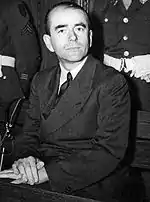
Albert Speer was a German architect who was, for part of World War II, Minister of Armaments and War Production for the Third Reich. Hitler commissioned Speer to design and construct a number of structures, including the Reich Chancellery and the Zeppelinfeld stadium in Nuremberg where Nazi Party rallies were held. Speer also made plans to reconstruct Berlin on a grand scale, with huge buildings, wide boulevards, and a reorganized transportation system. As Hitler's Minister of Armaments and War Production, Speer's reforms were so successful that Germany's war production continued to increase despite massive and devastating Allied bombing. As "the Nazi who said sorry", he accepted responsibility at the Nuremberg trials after the war and was sentenced to twenty years in prison for his role in the Nazi regime, principally for the use of forced labor. He served most of his sentence at Spandau Prison in West Berlin. Following his release from Spandau in 1966, Speer published two bestselling autobiographical works, Inside the Third Reich and Spandau: The Secret Diaries, detailing his often close personal relationship with Hitler, and providing readers and historians with a unique perspective inside the workings of the Nazi regime. (Full article...)